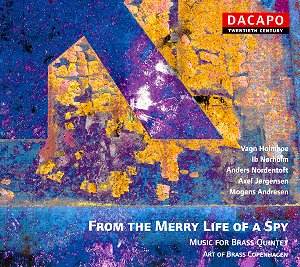Dacapo again enters
territory cherished by Crystal Records
and does so with substance and joy.
The
Holmboe is querulous, sardonic and heroic
but never loquacious. He is like a Nordic
Janáček writing with some highly
complex music in the finale which becomes
rather suggestive of Malcolm Arnold.
The 1978 quintet is in five movements
and is yet more subtle - elusive in
expressive language especially in its
second and fourth movements. The trouble-stilling
beauty of the Poco adagio is
one of the disc's highlights. The chubby
bubbling chatter of the allegro vivace
reminded me of Tippett's Sonata
for Four Horns. Holmboe adds salt
to his melodic inheritance locked into
folk roots.
Norholm is more caustic
in his jokily titled three movement
quintet. This rolls and rocks abrasively
in dissonant gesture as well as in serenade.
I would liken the style to Malcolm Arnold's
Symphony for Brass. The ‘Spy’
background seems almost irrelevant to
the music though there is perhaps a
sinister, hunted or surreptitious tone
to the music. The Nordentoft is yet
more gaunt - full of explosives and
interjections. Its most accessible movement
is the last of the three: Tiny Fanfares.
We then step back two generations to
Jorgensen (for many years a violist
with the Royal Danish Orchestra) and
his four movement wartime quintet. This
has a Nielsen-like lyricism though with
a yet lighter touch. This is sophisticated
light music for a seaside concert. It
has a knockabout ebullience - an Edwardian
weekend levity. Andersen marks out his
folk territory with clapping and stamping
amid the busy rolling and rollicking
writing for brass. Again Malcolm Arnold
would be a ready reference. The second
movement has the regretful atmosphere
of the tin mines movement of Arnold’s
Cornish Dances. No one can tell
me that the pecking impacts at the start
of the last movement are not intended
to refer affectionately to Nielsen's
Sinfonia Espansiva.
A varied package then.
It is predominantly approachable without
blandness but with the avant-garde style
strong in the Nordentoft and present,
though less so, in the Norholm.
This is a stunning
recording capturing the high trumpet
transients as well as the gruff edge
of the tuba and trombone. Cracking stuff!
Rob Barnett
